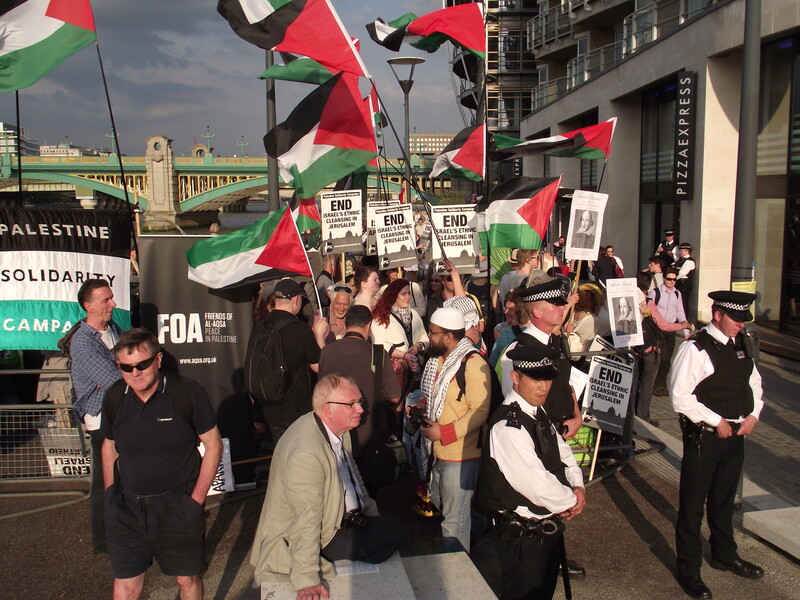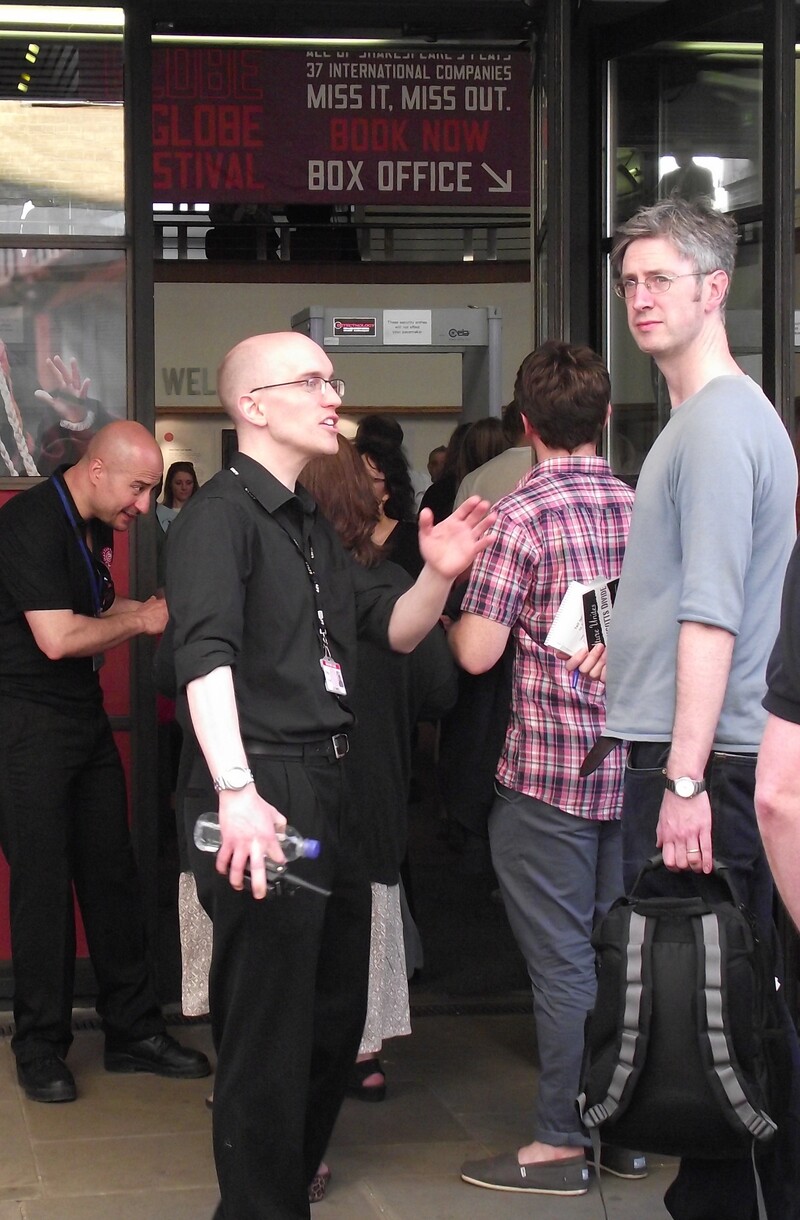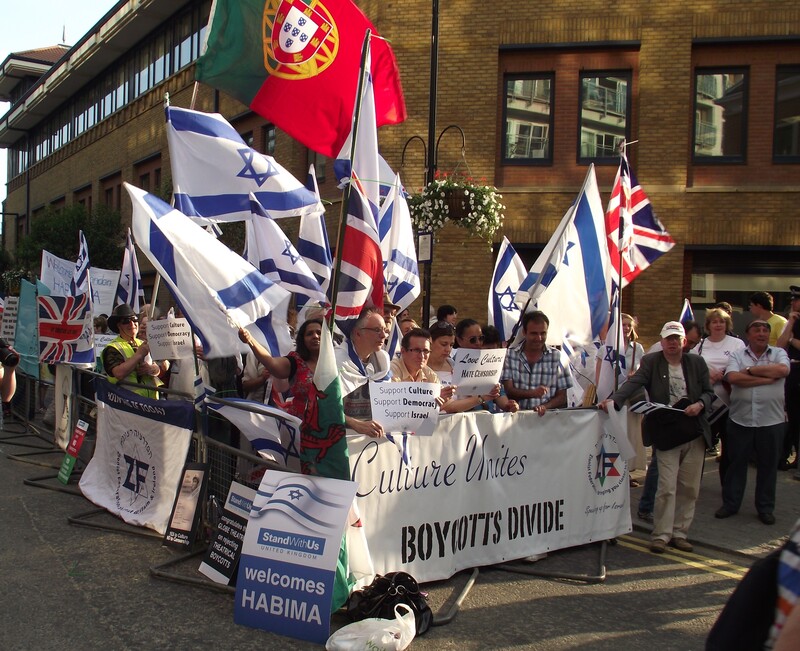Activism and BDS Beat 30 May 2012

Activists unfurl a banner against Habima inside the Globe theater
Israel’s national theater company performed The Merchant of Venice at Shakespeare’s Globe in London yesterday and Monday. But Habima’s presence was fiercely contested for months in advance, and both performances were disrupted by Palestine solidarity activists in the audience.
Around 15 activists managed to protest, mostly silently, during the Monday show. They were removed by heavy-handed security guards, apparently hired by the venue especially to protect the Israeli company.
Campaigners working as part of the boycott, divestment and sanctions (BDS) movement argued that Habima’s strong links to the Israeli state and its policies of colonising Palestinian land meant it should be boycotted.

Palestine solidarity demonstrators outside the Globe Theatre in London as Israel’s Habima performed inside.
The Electronic IntifadaHabima as a company is funded by the Israeli state has actively worked to help combat a boycott of illegal West Bank settlements by some Israeli actors.
The campaign won wide support in the UK’s dramatic community, including famous names like Emma Thompson and Alexei Sayle.
Activists inside were joined outside the venue by a protest of about 60 Palestine solidarity activists waving flags and banners, organized by the Palestine Solidarity Campaign (PSC). Flyers explaining their opposition to the state-supported Israeli theater group were handed out to passers-by along the busy Thames riverside walkway.
In the theater’s entrance lobby I saw that airport-style metal-detector arches had been set up. A member of Globe staff told me they were brought in purely for those two days.

A Globe staff member explains the meaning of “enhanced security”
The Electronic IntifadaAccounts from inside the Globe
Three activists from Brighton PSC, who I spoke to just after being ejected by security, gave me their account of what happened. They said they had managed to thwart security and sneak in a Palestinian flag and a banner reading “Israel apartheid: leave the stage”. The message was clear to both the audience and the Israeli actors: “The actors looked at us,” one activist said.
At the start of the performance, Dominic Dromgoole, the Globe’s artistic director made an announcement asking members of the audience not to take matters into their own hands, and that security would deal with any disruption. “If you say anything, you will be helping them,” Dromgoole warned, according to one activist I spoke to.
Despite that, mobile phone videos from inside show that there were pro-Israeli-apartheid activists inside the audience spitting insults at the peaceful protesters, chomping at the bit to take matters into their own hands, and allegedly assaulting one protester.

The Zionist counter-demonstration at its peak
The Electronic IntifadaA Zionist counter-demonstration held outside the Globe had dispersed soon after the play started (although not before singing God Save the Queen, the British national anthem). Some donned jackets and entered the theatre itself. The Zionist Federation (ZF) and StandWithUs wanted to make their point of support for Israeli apartheid clear.
One Palestine solidarity activist was arrested “on suspicion of assault on a security guard” a police spokesperson told the Press Association. He is understood to have been charged and released on bail.
In a detailed insider’s account posted on his blog, activist Tony Greenstein responded that: “Given the assaults by the security goons on other protestors, the fact that one protestor has been detained on suspicion of attacking a goon is ludicrous.”
Israel treats culture and political propaganda as indivisible
According to Jews For Boycotting Israeli Goods (J-BIG), the second performance last night was disrupted by “almost 20 peaceful protesters [who] brought their message of opposition to Israeli apartheid, colonisation and settlement into the auditorium”. This forced the production to pause several times, said J-BIG.
The group also said that security was “little less heavy handed” than Monday, and that this may have been a deliberate decision after the draconian “enhanced security” measures caused something of a backlash by UK theatre critics in their reviews of the opening night.
On EI, Ben White exposed an Israeli Embassy attempt to support Habima. An embassy circular suggested using the hashtag #loveculture, because it “won’t be taken at first glance as a political statement.”
Outside the venue, the ZF handed out a flyer pleading with the reader to “stand up to oppose those who wish to hijack artistic and cultural work for their own political aims”. It did not mention either the embassy campaign, or the £10,000 the Israeli government put into Habima’s London performances.
Naomi Wimborne-Idrissi, cultural working group coordinator of the Boycott Israel Network (BIN) said in a press release: “This is proof positive that as far as the Israeli state is concerned, culture and political propaganda are indivisible”.
Boycott of complicit Israeli cultural events is a wining strategy
Campaign supporters such as filmmaker Ken Loach and actors David Calder and Miriam Margolyes say Habima uses its art to normalise an unacceptable situation. Their complicity “makes a mockery of their claim to freedom in their work,” says Loach.
The performances went ahead, but not with out serious opposition. And not without BDS and the reality of Israeli war crimes, apartheid and colonialism being discussed and debated in UK newspapers for months in advance.
This is why BDS is a win-win strategy.
If boycott calls are heeded and complicit Israeli cultural entities have their international events cancelled, the message gets through to Israel that it can not carry on with “business as usual” while killing and dispossessing Palestinians, and defying their right to return.
If boycott calls are defied by venues like the Globe, then the heat and light generated around the BDS campaign still forces the Palestinian call to boycott issue onto the public agenda. Every UK venue considering hosting a complicit Israeli cultural ambassador will realistically have to factor in the cost of such “enhanced security” measure as the Globe took.
Every review by theater critics of the Habima performance I have read mentions the BDS campaign, the disruptions inside the Globe or both, often very sympathetically (even from those opposed to the boycott in some cases — J-BIG has collected a list of reviews). That would not have happened without BDS.
This is why Israel is worried enough about BDS to have held special hearings in the Knesset last week to discuss the UK as an “anti-Israel hub”. The Israeli parliamentary committee flew in British Zionist leaders especially for the occasion, to consult on strategies to combat BDS — or “delegitimization” as they term it.





